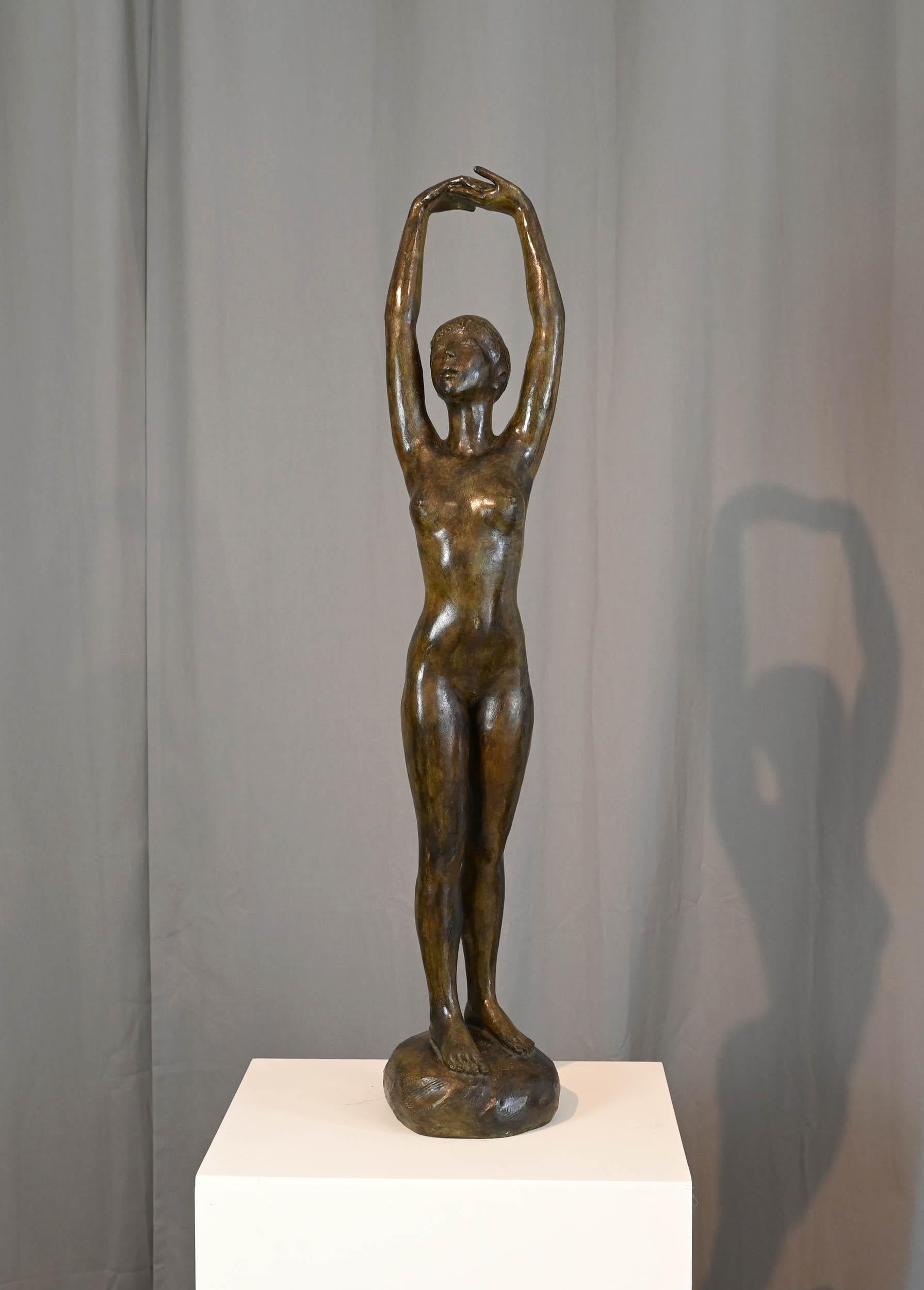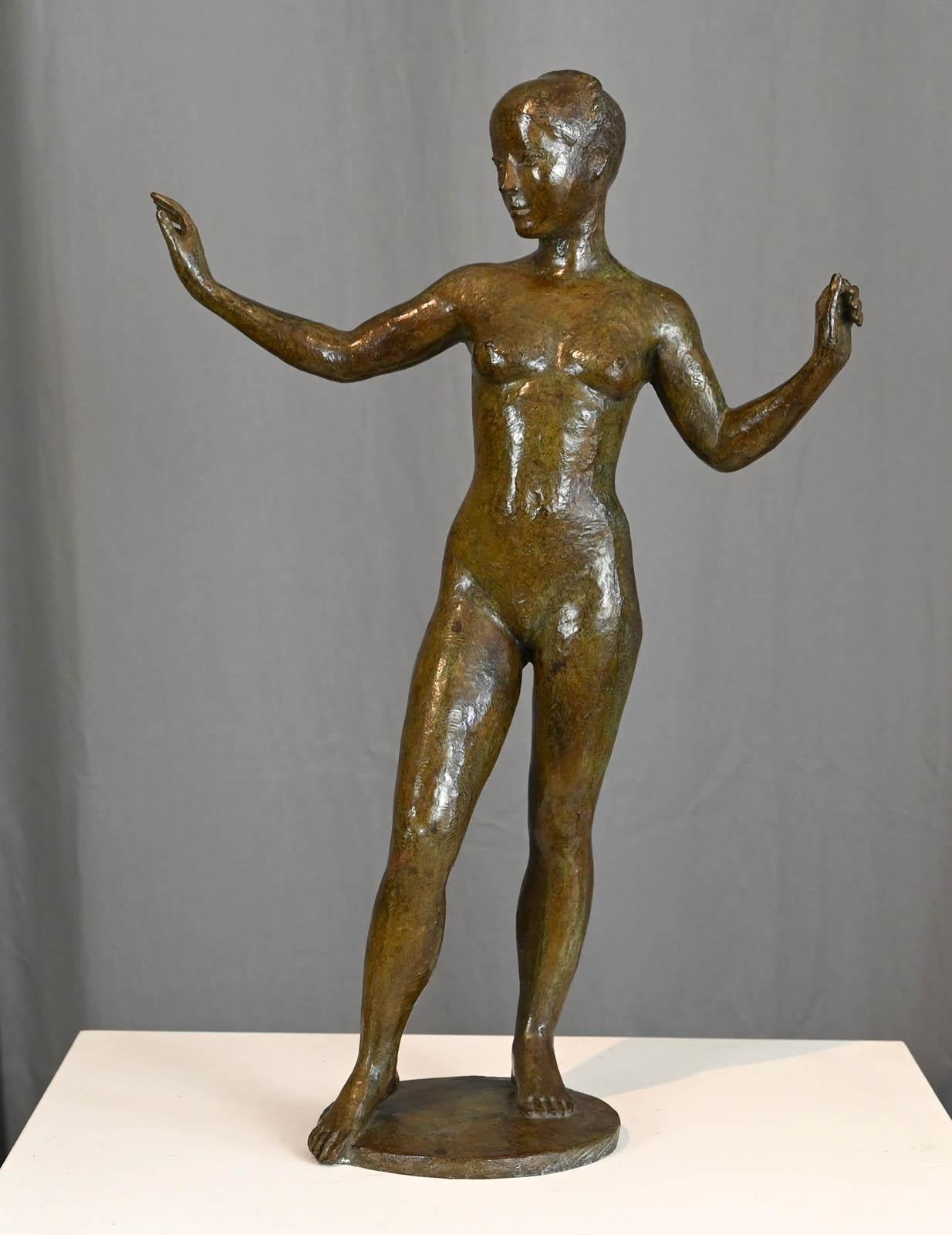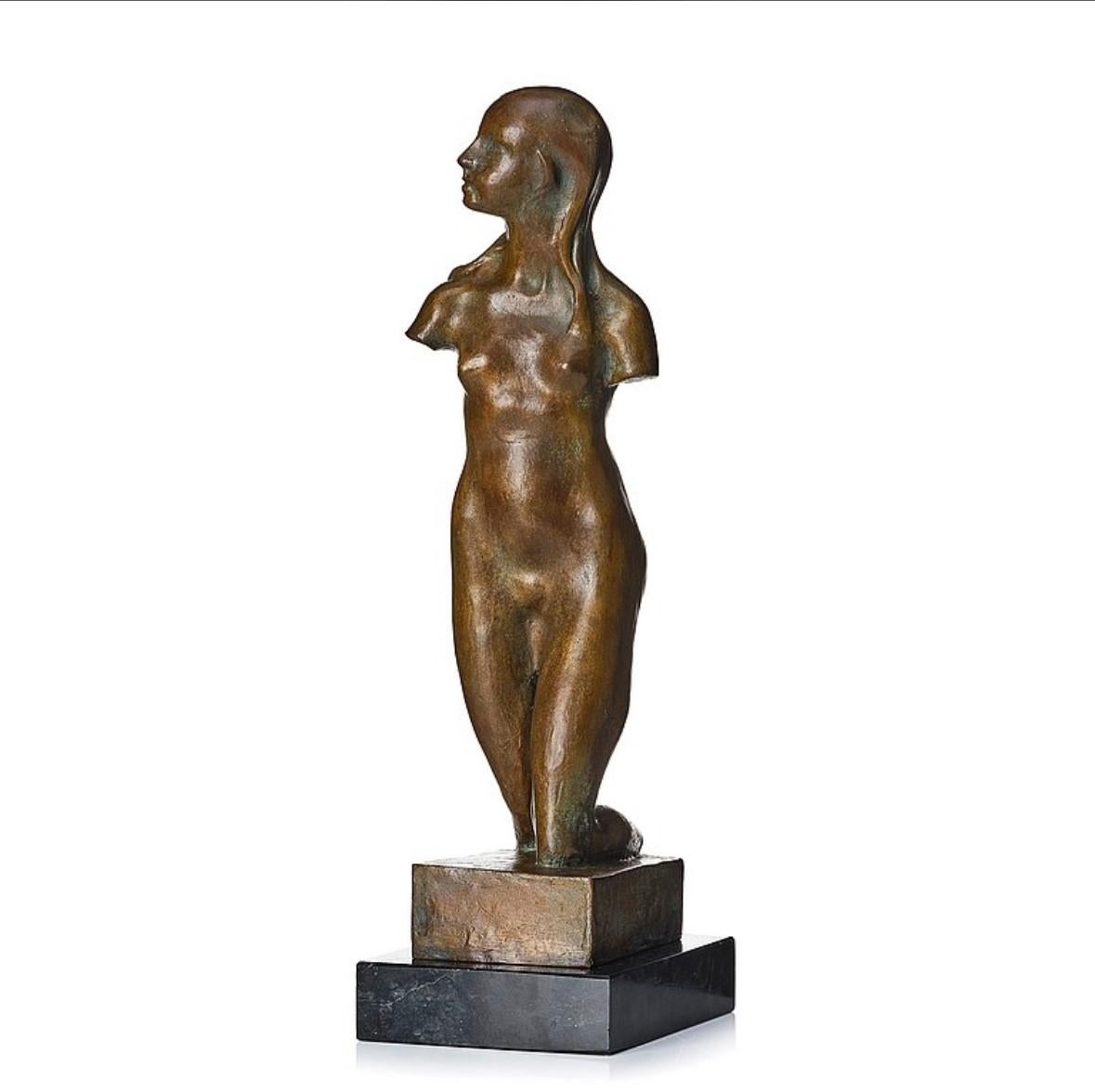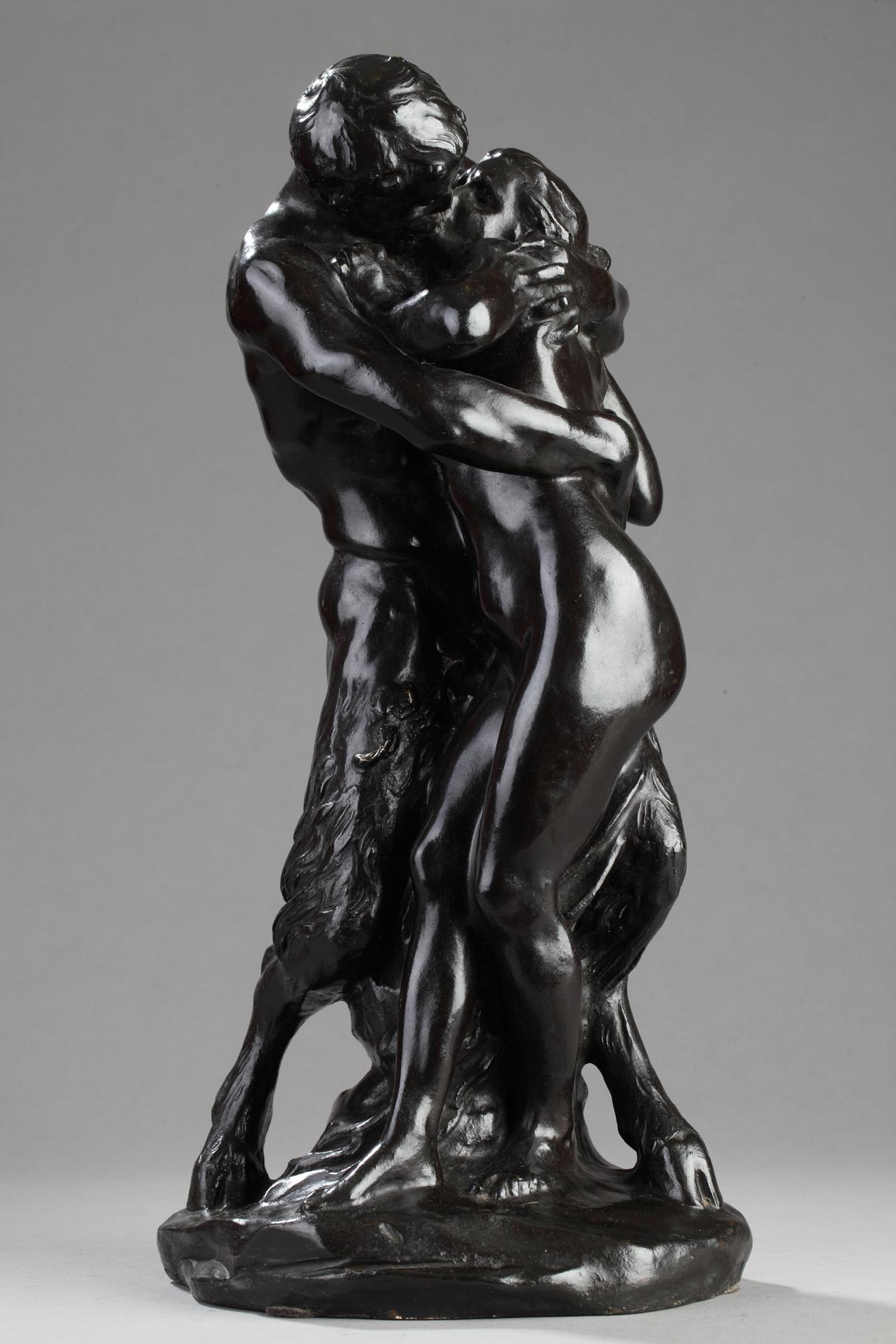Want more images or videos?
Request additional images or videos from the seller
Albert-Ernest Carrier-BelleuseSnake Charmercirca 1860
circa 1860
About the Item
Bronze sculpture with a nuanced dark brown patina
signed on the base "A. Carrier"
inscribed on a front plaque "Charmeuse de Serpents par Carrier-Belleuse"
France
circa 1860
height 80,5 cm
Biography :
Albert-Ernest Carrier de Belleuse known as Carrier-Belleuse (1824-1887) was one of the most prolific artists of the century and had the greatest successes under the Second Empire, enjoying the personal support of Napoleon III. His work was greatly influenced by the style of the Italian Renaissance and that of the 18th century, which he helped to bring up to date.
In 1837, the young Carrier-Belleuse apprenticed in the workshop of the engraver Bauchery. He was admitted soon after to the goldsmith Jacques Henri Fauconnier. Through François Arago, he met the sculptor David d'Angers who facilitated his admission to the School of Fine Arts. Carrier-Belleuse entered it in 1840. Noted for his skill by the great bronze companies in Paris such as Barbedienne and Denière, he soon received numerous orders for models for candelabras, pendulums, fittings for fireplaces, etc. In 1848, probably at the initiative of François Arago, who became head of state, he received his first public order for a small statue of "Mademoiselle Rachel singing La Marseillaise". In 1851, he appeared for the first time at the Salon of French Artists, where he presented two bronze medallions. From 1851 to 1855, Carrier-Belleuse stayed in England, in Stoke-on-Trent where he served as director of the modeling and drawing school of the Minton house, a large porcelain manufacturer.
Back in France, Carrier-Belleuse moved to Paris in a large workshop located 15 rue de la Tour d´Auvergne. From 1857, he made regular sendings to the Salon and became famous thanks to the success of large marbles, such as the "Bacchante" exhibited at the Salon in 1863, and acquired by Napoleon III, "Angelica" (1866) or even "Hebe asleep" (1869). At the Salon of 1867, his group entitled "Messiah" earned him the medal of honor of sculpture. It was acquired by the State to adorn the Chapel of the Virgin in the Saint-Vincent-de-Paul church.
Carrier-Belleuse acquired a great reputation in parallel for his terracotta busts which, in many respects, recall those of 18th century artists. He made portraits of a large number of celebrities of his time. He produced, among others, the busts of Napoleon III, Renan, Thiers, Grévy, Arago, Marguerite Bellanger, Théophile Gautier, Honoré Daumier, Delacroix, Hortense Schneider, Réjane… He also modelled numerous busts of mythological inspiration and historical and artistic portraits like Marie Stuart, Shakespeare or even Mozart.
Carrier-Belleuse used and trained in his workshop in the rue de la Tour d´Auvergne many young talented artists such as Alexandre Falguière, Jules Desbois, Eugène Delaplanche, Jules Dalou or Joseph Chéret; but he was best known for having been the master of Auguste Rodin who entered his studio as a practitioner in 1864.
Carrier-Belleuse devoted himself a lot to decorative sculpture. He contributed to the decorations of many important buildings. We owe him in particular the caryatids of the Renaissance theater in Paris, the pediment of the main entrance to the Banque de France, the stucco ceilings of the Lesdiguières and La Trémoïlle pavilions at the Louvre Palace, the frieze of the Palais de la Bourse in Brussels, or the decoration of the Hôtel de la Païva on the Champs-Elysées in Paris. He also received State commissions for monuments: that of Jean-Jacques Rousseau in Montmorency, of Alexandre Dumas, in Villers-Cotterêts, of Masséna in Nice. Abroad, he produced the equestrian statue of Michael the brave in Bucharest and the tomb of José de San Martín in Buenos Aires.
In 1873, Carrier-Belleuse took part in the construction of the Paris Opera house, directed by his friend Charles Garnier. He created the two monumental torchieres flanking the grand staircase in the main hall and the caryatids of the chimney of the grand foyer. In 1875, he was appointed director of works of art at the Porcelain Manufacture de Sèvres. He imprinted on it a very modern impulse which manifested itself in the creation of a complete range of vases.
- Creator:Albert-Ernest Carrier-Belleuse (1824 - 1887, French)
- Creation Year:circa 1860
- Dimensions:Height: 31.7 in (80.5 cm)Width: 9.06 in (23 cm)Depth: 11.03 in (28 cm)
- Medium:
- Movement & Style:
- Period:
- Condition:
- Gallery Location:PARIS, FR
- Reference Number:
Albert-Ernest Carrier-Belleuse
Albert-Ernest Carrier-Belleuse was a French sculptor. Carrier-Belleuse was born on 12th June 1824 at Anizy-le-Château, Aisne, France. He began his training as a goldsmith's apprentice. He was a student of David d'Angers and briefly studied at the École des Beaux-Arts. His career is distinguished by his versatility and his work outside France, in England between 1850–55 and in Brussels around 1871. His name is perhaps best known because Auguste Rodin worked as his assistant between 1864 and 1870. The two traveled to Brussels in 1871 and by some accounts, Rodin assisted Carrier-Belleuse's architectural sculpture for the Brussels Stock Exchange.
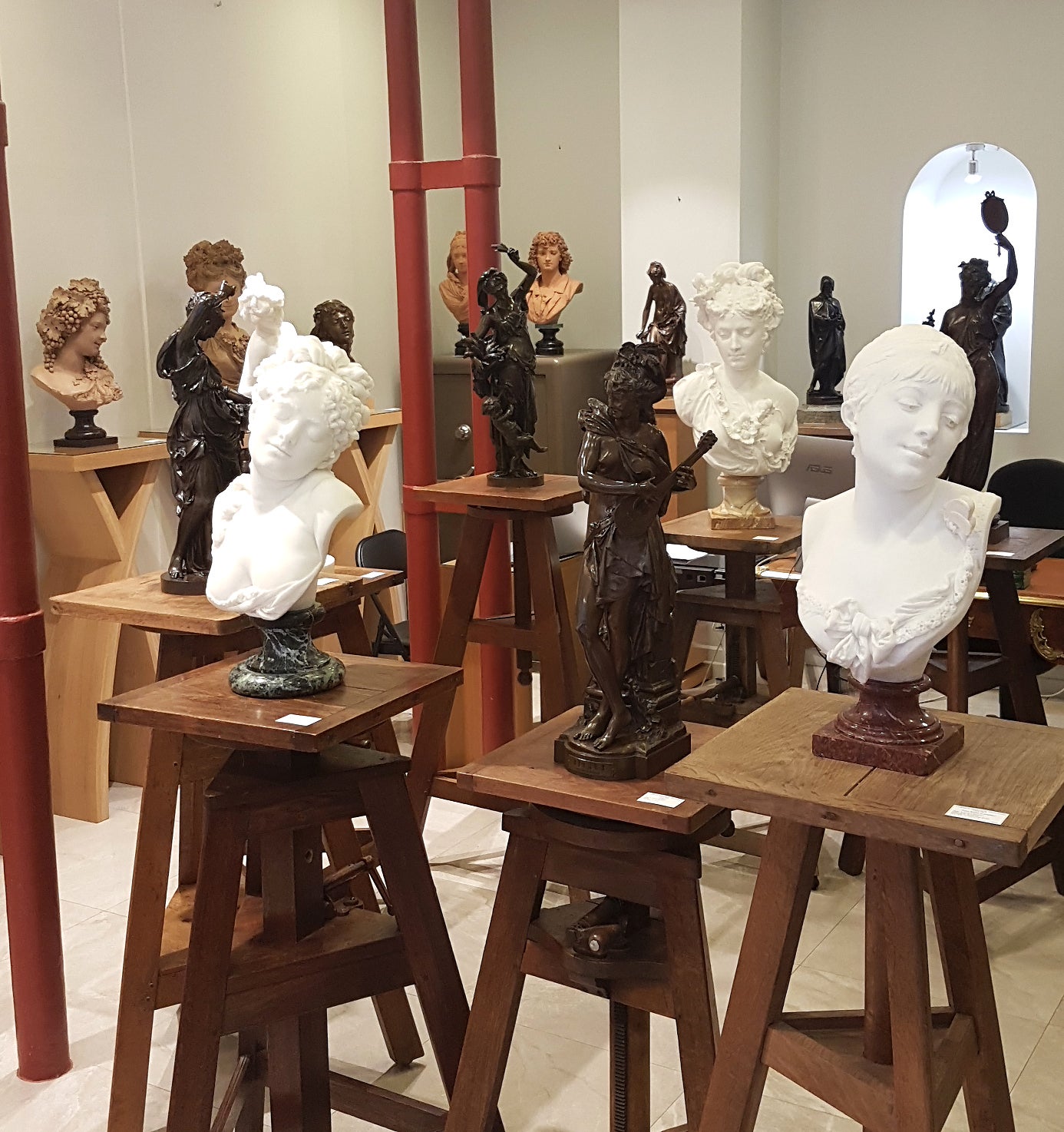
About the Seller
5.0
Vetted Seller
These experienced sellers undergo a comprehensive evaluation by our team of in-house experts.
Established in 1992
1stDibs seller since 2023
Typical response time: 17 hours
- ShippingRetrieving quote...Ships From: PARIS, France
- Return PolicyA return for this item may be initiated within 3 days of delivery.
More From This SellerView All
- Diana with an arrowBy Albert-Ernest Carrier-BelleuseLocated in PARIS, FRDiana with an arrow by Albert-Ernest CARRIER-BELLEUSE (1824-1887) Bronze sculpture with a dual light and dark brown patina signed on the base "Carrier-Belleuse" inscribed on a front plaque "Diane à la Flèche par Carrier-Belleuse (Sculptr)" France circa 1870 height 83 cm arrow added probably in the 20th c. Biography : Albert-Ernest Carrier de Belleuse known as Carrier-Belleuse (1824-1887) was one of the most prolific artists of the century and had the greatest successes under the Second Empire, enjoying the personal support of Napoleon III. His work was greatly influenced by the style of the Italian Renaissance and that of the 18th century, which he helped to bring up to date. In 1837, the young Carrier-Belleuse apprenticed in the workshop of the engraver Bauchery. He was admitted soon after to the goldsmith Jacques Henri Fauconnier. Through François Arago, he met the sculptor David d'Angers who facilitated his admission to the School of Fine Arts. Carrier-Belleuse entered it in 1840. Noted for his skill by the great bronze companies in Paris such as Barbedienne and Denière, he soon received numerous orders for models for candelabras, pendulums, fittings for fireplaces, etc. In 1848, probably at the initiative of François Arago, who became head of state, he received his first public order for a small statue of "Mademoiselle Rachel singing La Marseillaise". In 1851, he appeared for the first time at the Salon of French Artists, where he presented two bronze medallions. From 1851 to 1855, Carrier-Belleuse stayed in England, in Stoke-on-Trent where he served as director of the modeling and drawing school of the Minton house, a large porcelain manufacturer. Back in France, Carrier-Belleuse moved to Paris in a large workshop located 15 rue de la Tour d´Auvergne. From 1857, he made regular sendings to the Salon and became famous thanks to the success of large marbles, such as the "Bacchante" exhibited at the Salon in 1863, and acquired by Napoleon III, "Angelica" (1866) or even "Hebe asleep" (1869). At the Salon of 1867, his group entitled "Messiah" earned him the medal of honor of sculpture. It was acquired by the State to adorn the Chapel of the Virgin in the Saint-Vincent-de-Paul church. Carrier-Belleuse acquired a great reputation in parallel for his terracotta busts which, in many respects, recall those of 18th century artists. He made portraits of a large number of celebrities of his time. He produced, among others, the busts of Napoleon III, Renan, Thiers, Grévy, Arago, Marguerite Bellanger, Théophile Gautier, Honoré Daumier, Delacroix, Hortense Schneider, Réjane… He also modelled numerous busts of mythological inspiration and historical and artistic portraits like Marie Stuart, Shakespeare or even Mozart. Carrier-Belleuse used and trained in his workshop in the rue de la Tour d´Auvergne many young talented artists such as Alexandre Falguière, Jules Desbois...Category
1870s French School Nude Sculptures
MaterialsBronze
- Woman taking off her shirtLocated in PARIS, FRWoman taking off her shirt by James PRADIER (1790-1852) Bronze with a nuanced brown patina cast by SOYER and INGE France circa 1850 height 28,5 cm Biography : Jean-Jacques Pradier...Category
1850s French School Nude Sculptures
MaterialsBronze
- The KissBy Aimé-Jules DalouLocated in PARIS, FRThe Kiss also named "Nymph and Faun" by Jules DALOU (1838-1902) A bronze group with a black patina Signé "Dalou" A very fine cast by "A.A. Hébrard" (with the foundry stamp) The ca...Category
Early 1900s French School Figurative Sculptures
MaterialsBronze
- Young woman seated with draperyLocated in PARIS, FRYoung woman seated with drapery by Pierre-Marie POISSON (1876-1953) Bronze sculpture with nuanced green patina signed on the base "P. Poisson" old cast France circa 1935-40 height...Category
1930s French School Nude Sculptures
MaterialsBronze
- BatherLocated in PARIS, FRBather by Etienne Hachenburger (19th-20th C.) Sculpture in white Carrara marble Signed on the side of the base "E. Hachenburger" A simiilar model was exhibited at the Paris Salon oh...Category
Early 1900s French School Nude Sculptures
MaterialsMarble
- Torso of a WomanLocated in PARIS, FRTorso of a Woman by Marcel GIMOND (1894-1961) Avery fine nuanced brown chamotte sandstone sculpture raised on a dark grey marble base signed on the arm with the monogram "MG" for Ma...Category
1920s French School Figurative Sculptures
MaterialsTerracotta
You May Also Like
- VictoireLocated in LE HAVRE, FRJacques COQUILLAY (né en 1935) Victoire Original bronze Size : 105 x 22 x 20 cm Copy No. 1/8 Signature and numbered on the base. Original bronze m...Category
Early 2000s French School Nude Sculptures
MaterialsBronze
- MarieLocated in LE HAVRE, FRJacques COQUILLAY (né en 1935) Marie Original bronze Size : 56x39x17cm Copy No. 4/8 Signature and numbered on the base. Original bronze made with ...Category
Early 2000s French School Nude Sculptures
MaterialsBronze
- Female torsoLocated in Täby, SEGunnar Knut Nilsson, born 1904 in Karlskrona, died 1995 in Versailles in France, was a Swedish sculptor. Gunnar Nilsson studied watercolor painting and modeling at the Technical Vocational School in Karlskrona in 1918-19 and on his own in addition to working as a clerk at Finspångs Metallwerk. His debut exhibition was in Finspång in 1927. With the help of a local fundraiser, and after the encouragement of Carl Eldh, he traveled to Paris in 1928 to study sculpture for, among others, Charles Despiau and Paul Niclausse. In Paris he socialized with Bror Hjorth, whose former studio he also rented, Carl Frisendahl and Alberto Giacometti. He came to belong to "Le groupe des Neuf'' with Paul Cornet...Category
1950s French School Nude Sculptures
MaterialsBronze
- "Whirlwind", Martin Eichinger, Figurative, Bronze, Romantic, 54x84x72 in.By Martin EichingerLocated in Dallas, TXThe dynamic nature of this ecstatic pirouette must be experienced from all sides. Whirlwind examines the forces of attraction and separation in a relationship. The couple’s solid bon...Category
Early 2000s Realist Figurative Sculptures
MaterialsBronze
- Figura DistesaBy Franco FranchiLocated in Miami, FLFranco Mauro Franchi was born in Castiglioncello (Livorno) on 9 October 1951. He completed his artistic studies at the Lucca State Institute of Art and the Academy of Fine Arts in Fl...Category
Late 20th Century Contemporary Figurative Sculptures
MaterialsBronze
- Dionysisch Big Bronze Sculpture Mythology Classical Contemporary ArtBy Margot HomanLocated in Utrecht, NLDionysisch Big Bronze Sculpture Mythology Classical Contemporary Art The sculptures of Margot Homan (1956, Oss, NL) show a perfect command of the...Category
21st Century and Contemporary Contemporary Nude Sculptures
MaterialsBronze
